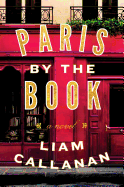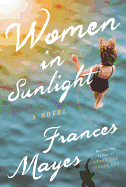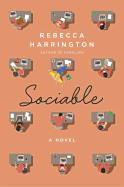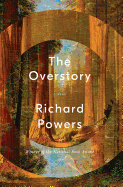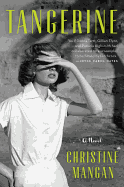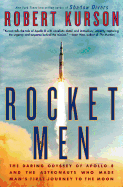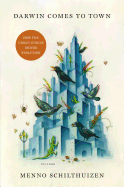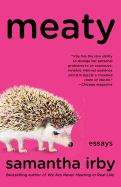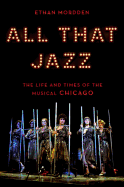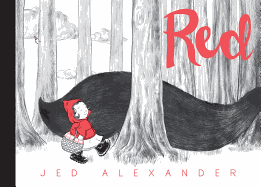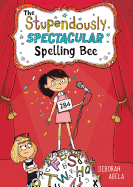 |
| photo: Tasha Thomas |
Lauren Moseley's poems have appeared in the anthologies Best New Poets and Women Write Resistance and in such magazines as FIELD, Narrative, Copper Nickel, West Branch Wired and Pleiades. She holds an MFA in Poetry from the University of North Carolina at Greensboro. Moseley has been a fellow at Yaddo and the Virginia Center for the Creative Arts and a recipient of an artist's grant from the Money for Women/Barbara Deming Memorial Fund. She lives in Durham, N.C., and works at Algonquin Books. Big Windows (Carnegie Mellon University Press, February 13, 2018) is her debut poetry collection.
On your nightstand now:
Blessing the Boats by Lucille Clifton, River Hymns by Tyree Daye, Between My Father and the King by Janet Frame, Catalog of Unabashed Gratitude by Ross Gay, In Which I Play the Runaway by Rochelle Hurt, Bestiary by Donika Kelly, The Argonauts by Maggie Nelson, Darwin's Mother by Sarah Rose Nordgren, The End of Pink by Kathryn Nuernberger, Artful by Ali Smith, Incendiary Art by Patricia Smith, We Are Only Taking What We Need by Stephanie Powell Watts and several Algonquin manuscripts. (I have a big nightstand. It's a problem.) Some of these I've read, some I'm in the middle of and some I've just started. I love rereading poetry collections especially, so those are particularly difficult to move from the land of The Nightstand to The Bookshelf.
Favorite book when you were a child:
Professor Possum's Great Adventure by Michael Pellowski. I grew up in a house in the woods in North Carolina, and my sister and I played at the creek nearly every day. Our mother is a biologist, specializing in ornithology, and our father also has a great love for nature and exploration. They raised us to be adventurers, and my sister has followed in my mother's footsteps. Now I'm the only woman in my nuclear family who isn't an ornithologist! When I was little, I loved Professor Possum, because he goes on a hair-raising journey to a jungle island in search of a rare species of butterfly. I now somewhat disapprove of the book's ending, because the professor takes butterflies and their preferred trees out of their natural habitat and reestablishes them in his own backyard (one could be arrested for doing such things with wildlife from a national park, for example), but when I was a child, that sounded like paradise. I wanted the natural world in my bedroom.
Your top five authors:
Jean Valentine
Alice Munro
Patti Smith
Shane McCrae
Tracy K. Smith
Book you've faked reading:
One day I sat down to read my two-year-old godson a book. He had selected Kay Thompson's Eloise, about the mischievous six-year-old girl who lives in the Plaza Hotel. Have you ever tried to read that book to a toddler in one sitting? He might as well have picked out Infinite Jest. Eloise is just 68 pages, but it has quite a lot of text for an illustrated book, thanks to the large trim size. We were late for lunch, so I eventually had to flip through dozens of pages, read the final lines, and say, "The end!" (which is, incidentally, exactly how I read Infinite Jest). I still feel bad about this.
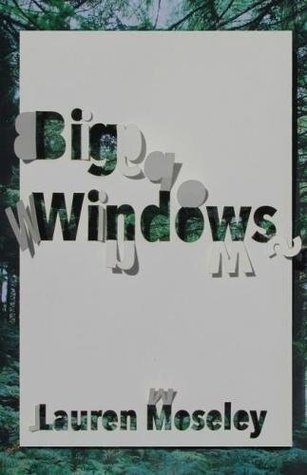 Book you're an evangelist for:
Book you're an evangelist for:
Marisa Silver's Little Nothing, a philosophical fairy tale in the form of an unputdownable novel. Read it, and then let's talk.
Book you've bought for the cover:
American Housewife by Helen Ellis, and I'm glad I did, because these stories are delightful, wickedly funny and so smart. I love this book.
Book you hid from your parents:
Buckland's Complete Book of Witchcraft. The movie The Craft came out when I was 13. It was a perfect storm.
Book that changed your life:
The Lice by W.S. Merwin forever changed me as a poet. Merwin's deliberate lack of punctuation requires so much more of every phrase and line. And somehow, without punctuation, the images shine through more brightly. It's magic.
Favorite line from a book:
I keep a notebook of quotes, and I love them all. Here's one, from Peter Wohlleben's The Hidden Life of Trees: "When I began my professional career as a forester, I knew about as much about the hidden life of trees as a butcher knows about the emotional life of animals." What a sharp simile.
Book you most want to read again for the first time:
Mudbound by Hillary Jordan. This is one of my favorite Algonquin books of all time, and the film version of the novel was nominated for four Oscars this year. The film is wonderful, but nothing can match this reading experience.
Five books you'll never part with:
Door in the Mountain by Jean Valentine--Jean is my favorite living poet, and she read from my copy of this book during a residency at the Virginia Center for the Creative Arts.
Going to Meet the Man by James Baldwin--If you can find prose more worthy of exaltation than passages from "Sonny's Blues" or "This Morning, This Evening, So Soon," please let me know!
The Soul Is Here for Its Own Joy: Sacred Poems from Many Cultures edited by Robert Bly--Highly recommended for both lovers of verse and those who rarely read poetry.
The Book of Imaginary Beings by Jorge Luis Borges--My second book of poems, which I'm working on now, is somewhat like a bestiary, and this is THE ULTIMATE bestiary.
Too Much Happiness by Alice Munro--In 2010, my husband and I were on a short vacation with his family, in Shepherdstown, W.Va. We stopped in Four Seasons Books, and I picked up a hardcover of Too Much Happiness, which had just come out. Shamefully, I hadn't read much Alice Munro before, but I read the first page of this collection and was instantly hooked. I went on to read every story she's ever published. It was a classic moment of indie bookstore browsing bliss.
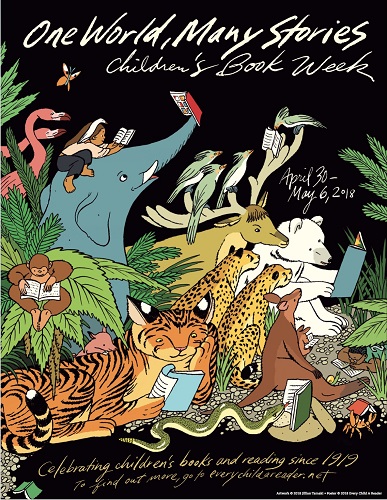 The 99th Children's Book Week begins in just a few days, starting Monday, April 30 and continuing through Sunday, May 6. This year's official poster is illustrated by Jillian Tamaki and inspired by the 2018 slogan, "One World, Many Stories," and there are exclusive bookmarks by children's book illustrators Sophie Blackall, Vashti Harrison, Don Tate, Leo Espinosa and Felicita Sala. Here's a look at some awesome works by the above illustrators to get you in the CBW spirit.
The 99th Children's Book Week begins in just a few days, starting Monday, April 30 and continuing through Sunday, May 6. This year's official poster is illustrated by Jillian Tamaki and inspired by the 2018 slogan, "One World, Many Stories," and there are exclusive bookmarks by children's book illustrators Sophie Blackall, Vashti Harrison, Don Tate, Leo Espinosa and Felicita Sala. Here's a look at some awesome works by the above illustrators to get you in the CBW spirit. 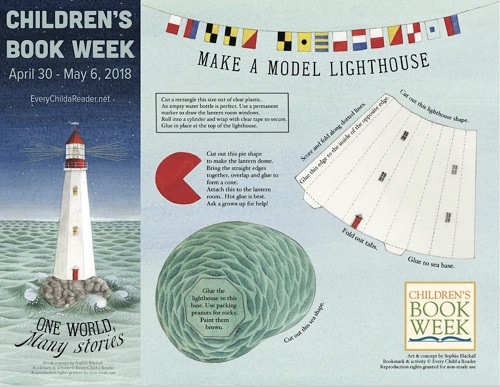 Don Tate's Strong as Sandow: How Eugen Sandow Became the Strongest Man on Earth is an honest and entertaining biography of Friedrich Wilhelm Müller/Eugen Sandow, a man once considered "the most perfect male specimen alive."
Don Tate's Strong as Sandow: How Eugen Sandow Became the Strongest Man on Earth is an honest and entertaining biography of Friedrich Wilhelm Müller/Eugen Sandow, a man once considered "the most perfect male specimen alive."



 Book you're an evangelist for:
Book you're an evangelist for: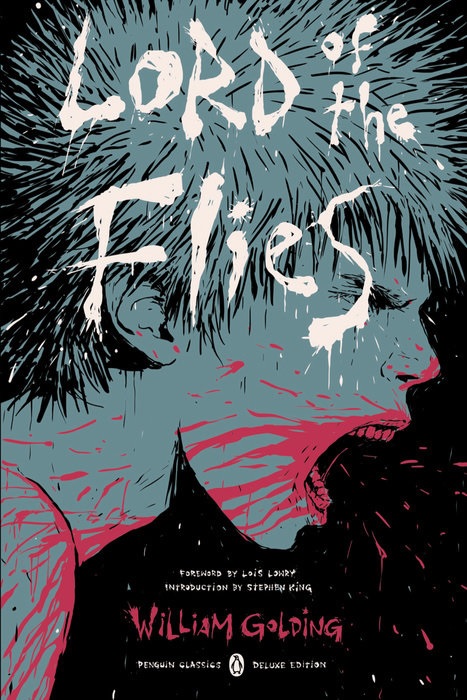 Lord of the Flies, William Golding's classic tale of juvenile savagery, turns 64 this year. It was his debut novel, and an initial commercial disappointment before exploding into the mega-bestseller now ensconced in the modern literary canon. Lord of the Flies also frequently lands on school reading lists, where children of similar age to Ralph and Piggy get dark glimpses of ids untethered by island isolation. The descent of British schoolboys from airplane crash survivors into tribal murderers has left indelible marks on pop culture--the conch, the hog's head swarming with flies, poor Piggy and his glasses--and sewed seeds of inspiration in whole generations of writers. Stephen King's fictional town of Castle Rock, Maine was named after the boulder formation used as a fort by Jack's rival tribe in Lord of the Flies. King also wrote an introduction to a 2011 edition of the book released for Golding's 100th birthday (he died in 1993).
Lord of the Flies, William Golding's classic tale of juvenile savagery, turns 64 this year. It was his debut novel, and an initial commercial disappointment before exploding into the mega-bestseller now ensconced in the modern literary canon. Lord of the Flies also frequently lands on school reading lists, where children of similar age to Ralph and Piggy get dark glimpses of ids untethered by island isolation. The descent of British schoolboys from airplane crash survivors into tribal murderers has left indelible marks on pop culture--the conch, the hog's head swarming with flies, poor Piggy and his glasses--and sewed seeds of inspiration in whole generations of writers. Stephen King's fictional town of Castle Rock, Maine was named after the boulder formation used as a fort by Jack's rival tribe in Lord of the Flies. King also wrote an introduction to a 2011 edition of the book released for Golding's 100th birthday (he died in 1993). 